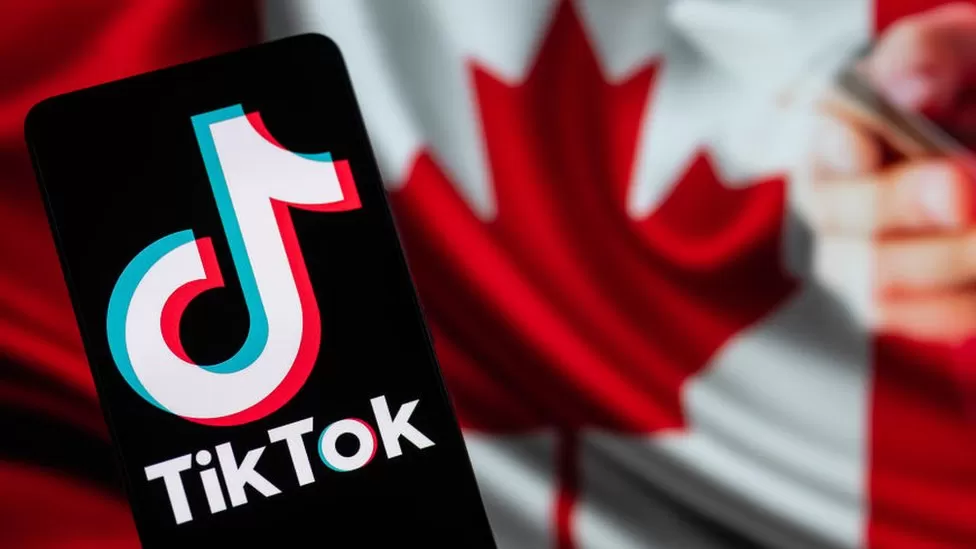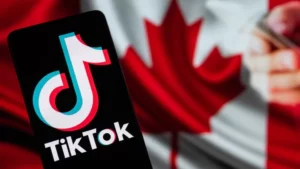The decision follows a review by Canada’s chief information officer, and the app “presents an unacceptable level of risk to privacy and security”, a government spokesperson said in a statement.
A TikTok spokesperson said the company was disappointed by the decision.
It comes just days after the European Commission announced a similar ban.
Prime Minister Justin Trudeau said there was enough concern about security around the app to require the change.
“This may the first step, this may be the only step we need to take,” he said on Monday at a press conference near Toronto.
The short-form video app is owned by Chinese firm ByteDance Ltd.
US federal employees were banned from using TikTok late last year, and on Monday the White House gave government agencies 30 days to scrub the app from their systems.
A number of American universities have banned the app from being used on their networks. Broader public bans have been implemented in India and several other Asian countries.
The company insists that Chinese government officials don’t have access to user data and that a Chinese version of the app is separate from the one used in the rest of the world. But last year, the company admitted some staff in China can access the data of European users.
The ban for European Commission employees is set to come into force on 15 March.
About a quarter of Canadian adults use the app, according to a recent survey by researchers at the Social Media Lab at Toronto Metropolitan University.
In a statement, Mona Fortier, the president of Canada’s Treasury Board, said the government “is committed to keeping government information secure”.
The app will be removed from government-issued phones this week and other devices and blocked from downloads in the future.
“On a mobile device, TikTok’s data collection methods provide considerable access to the contents of the phone,” Ms Fortier said. “While the risks of using this application are clear, we have no evidence at this point that government information has been compromised.”
The Treasury Board, which oversees the operations of the federal government, includes the country’s chief information officer.
In a statement, a company spokesperson said the ban on government-issued devices happened “without citing any specific security concerns about TikTok or contacting us to discuss any concern prior to making this decision”.
“We are always available to meet with our government officials to discuss how we protect the privacy and security of Canadians, but singling out TikTok in this way does nothing to achieve that shared goal,” the spokesperson said.
“All it does is prevent officials from reaching the public on a platform loved by millions of Canadians.”
European Commission bans TikTok on staff devices
Meanwhile, staff working at the European Commission have been ordered to remove the TikTok app from their phones and corporate devices.
The commission said it was implementing the measure to “protect data and increase cybersecurity”.
TikTok, owned by Chinese company ByteDance, has faced allegations that it harvests users’ data and hands it to the Chinese government.
TikTok insists it operates no differently from other social media.
“The measure aims to protect the Commission against cybersecurity threats and actions which may be exploited for cyberattacks against the corporate environment of the commission,” she said.
The commission says it has around 32,000 permanent and contract employees.
They must remove the app as soon as possible and no later than 15 March.
For those who do not comply by the set deadline, the corporate apps – such as the commission email and Skype for Business – will no longer be available.
TikTok said the commission’s decision was based on mistaken ideas about its platform.
“We are disappointed with this decision, which we believe to be misguided and based on fundamental misconceptions,” a spokesperson said.
TikTok’s parent company ByteDance has faced increasing Western scrutiny in recent months over fears about how much access Beijing has to user data.
The US government banned TikTok last year on federal government-issued devices due to national security concerns.
The US fears the Chinese government may leverage TikTok to access those devices and US user data.
Last month, the Dutch government reportedly advised public officials to steer clear of the app over similar concerns.
In the UK, the chair of the Foreign Affairs Select Committee, MP Alicia Kearns, recently urged users to delete the app in an interview with Sky News.
The social media service’s chief executive Shou Zi Chew was in Brussels in January for talks with EU officials during which they warned TikTok to ensure the safety of European users’ data, adding that it had a long way to go to regain their trust.
He insisted the company was working on a “robust” system for processing Europeans’ data in Europe, an EU spokesman said at the time.
TikTok has also promised to hold US users’ data in the United States to allay Washington’s concerns.
An EU source told the BBC the Council of the European Union is also in the process of implementing measures similar to those taken by the Commission.
But the European Parliament said although it is taking note of the Commission’s statement, TikTok is not part of the standard configuration for corporate devices.
“The Parliament is constantly monitoring cybersecurity threats and actions which may be exploited for cyber-attacks against its corporate environment,” the source said.
Czech MEP Markéta Gregorová said she was “very glad” that the Commission had made this decision and criticised the “hostility” of the Chinese government.
“I also hope that this will open a general discussion about cybersecurity within our institutions and how much the individual levels differ across Commission, Parliament and Council,” she said.
BBC



